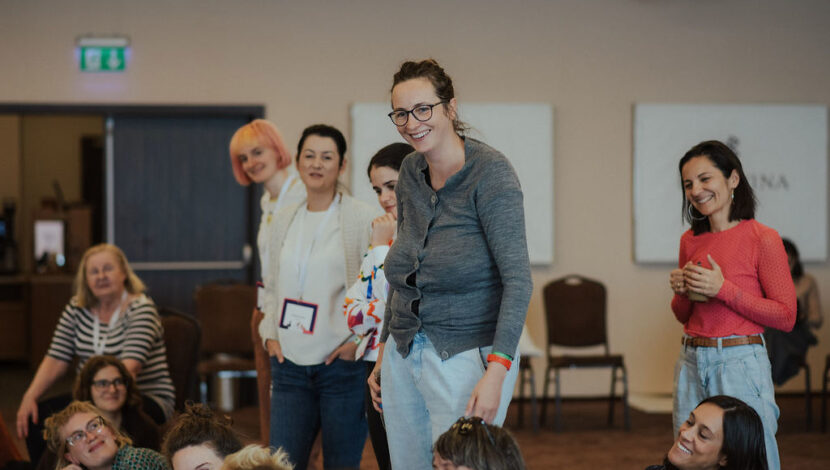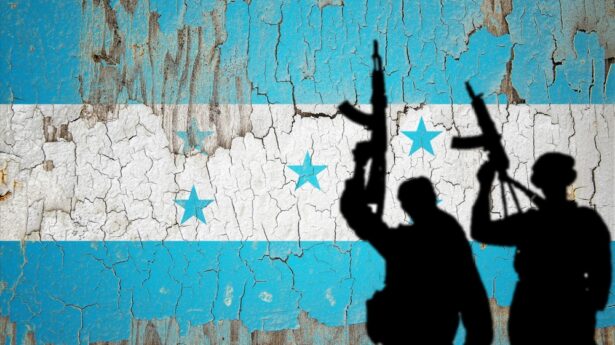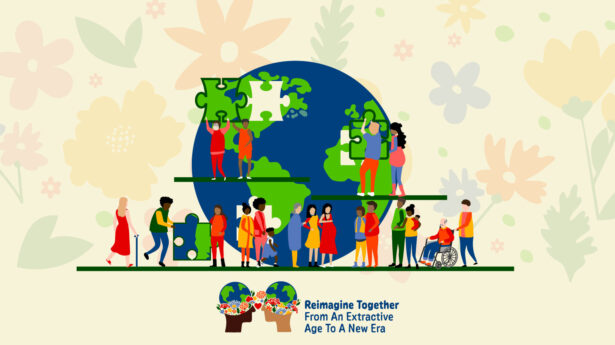The Unitarian Universalist Service Committee advances human rights through grassroots collaborations.
Regional Women’s Funds Address the Crisis in Nagorno-Karabakh

By Rachel Gore Freed on October 3, 2023
“Solidarity is not a scarce resource in a zero-sum game. It is not an equation that divides; rather, it is one that multiplies.” — Saidiya Hartman
Feminist leaders in Central and Eastern Europe, Caucasus, and Central and North Asia (CEECCNA) are calling for global solidarity in the face of an overlooked humanitarian crisis in Nagorno-Karabakh—a landlocked territory in the Caucasus region.
UUSC is amplifying the call of the Women’s Fund Armenia and CEECCNA Collaborative Fund to engage in global solidarity to respond to the crisis.
Azerbaijan imposed a blockade in December of last year, closing off the only road that connects Nagorno-Karabakh to neighboring Armenia. Located in the South Caucasus, Nagorno-Karabakh is a disputed territory traditionally considered to be part of Azerbaijan, though it has been governed by ethnic Armenians beginning in 1994 up until the territory’s dissolution as a republic in September 2023.
This act deprived the ethnic Armenian civilian population of access to food and medicine, increased rates of food insecurity, and caused at least one known death from starvation. The signing of an agreement by the state of Azerbaijan with Anglo-Asian Mining regarding three more new mining areas in 2022 also increased the critical importance of this corridor. Thus, the agreement connected capitalist interests with the military, which reflected underlying motivations and provided the infrastructure for imperialist ambitions.
In September, Azerbaijan escalated the crisis still further by once again deploying its armed forces to Nagorno-Karabakh—using the same language used by Vladamir Putin and the Russian government when commencing a full-scale invasion of Ukraine in February 2022, to ostensibly crush and root out the region’s, “anti-terrorist operation,” which to many is the unrecognized separatist government. Azerbaijan’s military operation violated the terms of an earlier negotiated ceasefire that halted fighting in the region after the last outbreak of war ended in 2020.
The renewed fighting compounds the humanitarian crisis the people of Nagorno-Karabakh were already facing in the form of hunger and enforced isolation caused by Armenia’s blockade. Within days of Azerbaijan’s military action, over 100,514 ethnic Armenian civilians had already fled the area for safety abroad.
Already, Azerbaijan’s actions may amount to crimes against humanity. The textbook definition of genocide, under international law, includes deliberately imposing, “conditions of life calculated to bring about the physical destruction of a group in whole or in part.” Denying access to food and basic supplies in order to starve a civilian population into submission, if done with the intent to destroy them as a group, would meet this definition. For this reason, international scholars warn that Azerbaijan’s actions in Nagorno-Karabakh may constitute genocide.
Feminist Response
Care is the antithesis of conflict. Feminist movement leaders are seeking to change this situation by drawing international attention to the mass displacement of the Armenian population living in Nagorno-Karabakh. You can support their efforts and learn more by following their calls to action here. The CECCNA Collaborative Fund and Armenian Women’s Fund specifically recommend supporting the following feminist organizations working on the ground in the region. These local organizations are providing critical emergency humanitarian support to the forcibly displaced people in Armenia, covering essential supplies, food, hygiene products, heaters, and shelter:
- Armavir Development Center: AdministeringP primary needs assessment and psychosocial support to the displaced population from NK;
- FemForward NGO: Providing emergency support to women in Gegharkunik region;
- Frontline Youth Network: Working with local government representatives to help them respond to crisis and receive the displaced people in regional towns;
- Sose Women’s NGO in Goris: Providing first-hand humanitarian support to newly arrived forcibly displaced people in the Syunik region: the main recipient of the displaced Armenian population;
- Spitak Helsinki Group: Providing psycho-social support and kits with essential hygiene products to displaced groups, particularly women in the Lori region;
- Queer Sista Platform: Safe space, trauma-healing psychosocial support, and art therapy for LBQ community;
- Women’s Agenda: Coordinating joint gender-responsive early warning efforts and providing crisis-response through working with journalists and international stakeholders;
- Women’s Center Shushi: An organization previously based in NK, now working with displaced women in Armenia and providing short- and long-term support;
- Women’s Fund Armenia: Supporting women-led movements to address gender-based human rights violations in Armenia; and
- Women’s Resource Center: Providing emergency kits, and gender-sensitive hygiene products and focusing on the sexual and reproductive health and rights of displaced women.
While UUSC is not positioned to resource every institution that is fighting oppression and the violation of human rights, we are committed to acts of radical trust and solidarity with movements for justice. As defined in a previous blog, UUSC supports feminist movement building, an evolving body of work that prioritizes the inclusion—and leadership—of women, girls, and members of the LGBTQ community to challenge traditional methods of fighting injustice. Rooted in patriarchy and misogyny, these methods have often excluded the wisdom, expertise, and knowledge of marginalized identities based on gender, gender identity, race, sexual orientation, age, and ability in humanitarian and human rights response work. This reflection is in support of a growing movement of feminist organizing centering just responses to crises based on an anti-patriarchal framework.
UUSC’s history as an organization calls us to lend our voice in solidarity with these efforts.
We were founded to resist genocide and it’s many ramifications, and our work is rooted in our present-day strategic commitment to international justice and accountability for crimes against humanity in Burma and elsewhere. We are also building an accountable partnership model in support of social movements resisting militarism, colonialism, patriarchy, and racialized capitalism globally.
With women in Nagorno-Karabakh sitting at the center of this crisis who now must experience the compounded effects of this conflict with a conservative patriarchal internal culture, feminist leadership is essential to any resolution. Feminist organizing and movement building is a moral counterweight to the patriarchal and sexist policies that not only define the cultures of many of the communities we serve, but of the institutions and systems that respond with support.
Read here for more information about our support for the CEECCNA Collaborative Fund.
Learn more about UUSC’s Emergency Response Fund and our regional presence supporting feminist organizing in Eastern Europe.
Image Credit: Voices Amplified 2021 Feminist Movement Convening

